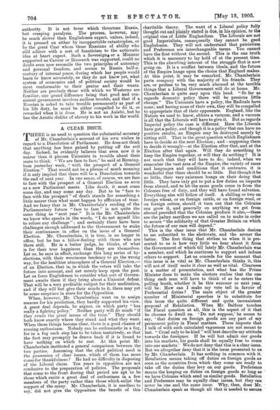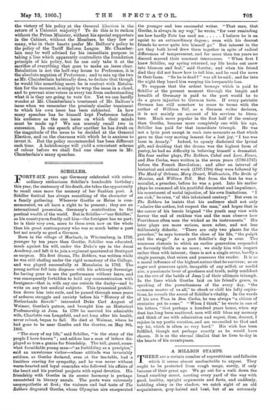A CLEAR ISSUE. T HERE is no need to question the
substantial accuracy of Mr. Chamberlain's account of his own wishes in regard to a Dissolution of Parliament. He does not think that anything has been gained by putting off the evil day. Indeed, he evidently believes that even now it is nearer than it pleases Unionists in trouble about their seats to think. "We are face to face," he said at Birming- ham yesterday week, "with the prospect of a General Election." That would not be a phrase of much meaning if it only implied that there will be a Dissolution towards the end of next year. In one sense, of course, we are face to face with the prospect of a General Election as soon as a new Parliament meets. Like death, it must come some day, and may come any day. But to be "face to face with the prospect" of death stands for something a little nearer than what must happen by eftluxion of time. And we fancy that in Mr. Chamberlain's reading of the Parliamentary future "face to face" is not quite the same thing as "next year." It is the Mr. Chamberlain we know who speaks in the words, "I do not myself like to refuse any challenge " ; and certainly there have been challenges enough addressed to the Government to stake their continuance in office on the issue of a General Election. Mr. Chamberlain, it is true, is no longer in office, but he has a fellow-feeling with those who are there still. He is a better judge, he thinks, of what is for their true happiness than they are themselves. Let us, he says in effect, exchange this long series of by- elections, with their wearisome tendency to go the wrong way, for the healthier atmosphere of a General Election,— of an Election, that is, in which the voters will take the future into account, and not merely harp upon the past. Let us force Englishmen to consider what sort of Govern- ment awaits them if they bring about a Unionist defeat. That will be a very profitable subject for their meditation, and if they will but give their minds to it, there may yet be some surprises in store for the Opposition. When, however, Mr. Chamberlain went on to assign reasons for his prediction, they hardly supported his view. A great deal depends, he argues, on which party "has really a fighting policy." Neither party will do much "if they evade the great issues of the time." They should both know exactly where they stand and what they want. When these things become clear, there is a good chance of rousing enthusiasm. Nobody can be enthusiastic in a fog, for in a fog each step has to be taken tentatively, so that the foot may promptly be drawn back if it is found to have nothing on which to rest. At this point Mr. Chamberlain instituted a general comparison between the two parties. Assuming that the chief political need is the possession of clear issues, which of them has more cause for thankfulness ? He had no difficulty in disposing of the Liberal claim. Ten years in opposition are not conducive to the preparation of policies. The proposals that come to the front during that period are apt to be those which excite a great deal of enthusiasm in a few members of the party rather than those which enlist the support of the many. Mr. Chamberlain, it is needless to say, did not give the Opposition the benefit of this charitable theory. The want of a Liberal policy fully thought out and plainly stated is due, in his opinion, to the original vice of Little Englandism. The Liberals are not good Imperialists, consequently they cannot be good Englishmen. They will not understand that patriotism and Preference are interchangeable terms. iron cannot have the first without the second. This is the one truth which it is necessary to lay hold of at the present time. This is the absorbing interest of the struggle that is now going on. It is a conflict between ideals, and the future of the Empire hangs upon the choice that England makes. At this point, it may be remarked, Mr. Chamberlain parts company with the majority of his friends. They are, or profess to be, very much alarmed at the terrible things that a Liberal Government will do at home. Mr.
Chamberlain is quite easy upon this head. "So far as regards domestic policy there will be precious little change." The Unionists have a policy, the Radicals have none; and having none of their own, they will be compelled to appropriate that of their opponents. England, like the Nature we used to know, abhors a vacuum, and a vacuum is all that the Liberals will have to give it. But as regards Imperial policy the case is different. Here the Liberals have got a policy, and though it is a policy that can have no positive results, an Empire may be destroyed merely by sitting still. That is the great question which Englishmen have to decide at the next Election; and—supposing them' to decide it wrongly—at the Election after that, and at the Election after that again. Will they do something to keep the Empire together, or will they do nothing ? It is not much that they will have to do; indeed, when we remember the vast area of the Empire, the variety of races and languages and conditions that it embraces, it is wonderful that there should be so little. But though it be so little, their very existence hangs on their doing that little. They have only got to put a few duties on imports from abroad, and to let the same goods come in from the Colonies free of duty, and they will have found salvation. Everything else will follow of itself. A shilling or two on foreign wheat, or on foreign cattle, or on foreign wool, or on foreign cotton, should it turn out that the Colonies can grow it, and generally on anything we get from abroad provided that the Colonies produce it also,—these are the paltry sacrifices we are called on to make in order to secure "the solidarity of that Greater Britain on which the future of our race will depend."
This is the clear issue that Mr. Chamberlain desires to see submitted to the electorate, and the sooner the better. The first thing that strikes us when it is pre- sented to us is how very little we hear about it from the Government of which till lately Mr. Chamberlain was a member, and which he continues to support and induce others to support. Let us concede for the moment that this issue is as vital as Mr. Chamberlain thinks it, this will not of itself make it clear as well as vital. Clearness• is a matter of presentation, and what has the Prime Minister done to make the electors realise that the one thing each man will have to think of as he enters the polling booth, whether it be this summer or next year, will be : How can I make my vote tell in favour of Preferential duties ? The main object of the greater number of Ministerial speeches is to substitute for this issue the quite different and quite inconsistent proposal of Retaliation. When Mr. Balfour touches the Fiscal question at all, this is the aspect of it that he chooses to dwell on. Do not suppose,' he seems to say, that duties on foreign goods are any part of my permanent policy in Fiscal matters. These imposts that I talk of with such calculated vagueness are not meant to last. "Cruel only to be kind. "will best describe my attitude towards the foreigner. If he will but admit our goods into his markets, his goods shall be equally free to come into our markets.' We do not deny that this is a clear issue. But we altogether deny that it is the issue presented to us by Mr. Chamberlain. It has nothing in common with it. Retaliation means taking off duties on foreign goods as soon as the countries from which they come are ready to take off the duties they levy on our goods. Preference means the keeping on duties on foreign goods so long as - we have Colonies which send us similar goods. Retaliation and Preference may be equally clear issues, but they can never be one and the same issue. Why, then, does Mr. Chamberlain speak as though all that is needed to secure the victory of his policy at the General Election is the return of a Unionist majority? To do this is to reckon without the Prime Minister, without his special supporters in the Cabinet, without the Members, be they few or many, who in their hearts prefer Mr. Balfour's policy to the policy of the Tariff Reform League. Mr. Chamber- lain may be well advised for his immediate purpose in taking a line which apparently contradicts the foundation principle of his policy, but he can only take it at the sacrifice of everything that goes to make an issue clear. Retaliation is not the half-way house to Preference, it is the absolute negation of Preference ; and to mix up the two as Mr. Chamberlain habitually does, to declare that though he would like something more he is content with Retalia- tion for the moment, is simply to wrap the issue in a cloud, and to prevent nine voters in every ten from understanding what it is they are going to vote for. Yet we can hardly wonder at Mr. Chamberlain's treatment of Mr. Balfour's issue when we remember the precisely similar treatment to which his own issue has been subjected. In how many speeches has he himself kept Preference before his audience as the one issue on which their minds must be made up ? We can scarcely recall two in succession. In one speech after another he has dwelt on the magnitude of the issue to be decided at the General Election, and on the clearness with which he is anxious to invest it. But the policy recommended has been different each time. A kaleidoscope will yield a consistent scheme of colour before we shall find one clear issue in Mr. Chamberlain's many speeches.







































 Previous page
Previous page